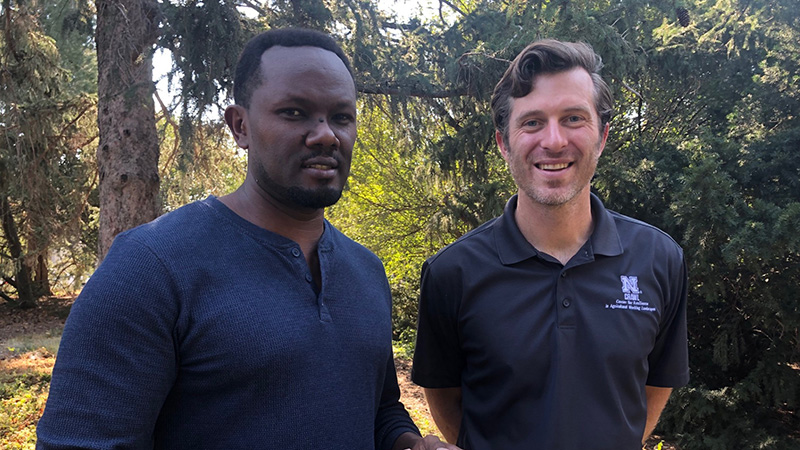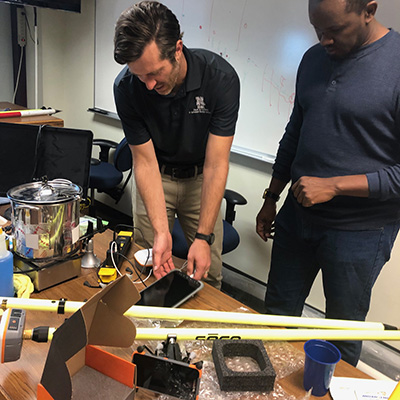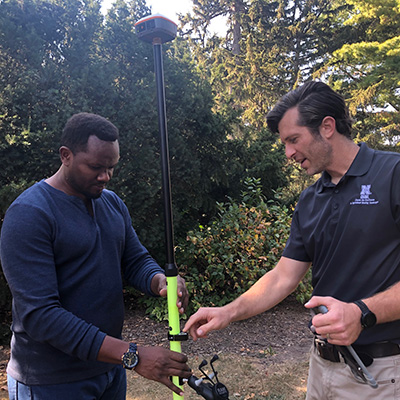Posted: 10/24/2024
Nshutiyayesu to amp up conservation agriculture in Rwanda with Nebraska know-how

By Ronica Stromberg
Samuel Nshutiyayesu may need a bigger suitcase.
He came to University of Nebraska-Lincoln in September to build his knowledge and skills in conservation agriculture and learn the latest in remote-sensing and GIS and GPS technologies. He plans to return to his home country of Rwanda with that knowledge and, possibly, equipment, but he has discovered something else he’d like to take home ... Nebraska nice.
"I want to take this culture back home," the 45-year-old doctoral student said after his first month in Nebraska.
Nebraskans have shown themselves to be 'loving and welcoming people,' offering in so many ways to help him, he said. Even the Nebraska way of holding a door open for the person following after you caused him to marvel about the goodness of residents in the Big Red state.
"Maybe you can see it as reasonable, but when someone goes in front of you and opens the door and keeps the door for you to come. Maybe for here, it's just normal, but for a newcomer like me these small gestures carry significant weight," he said.
Nshutiyayesu works as a conservation ecology lecturer at the Rwanda Institute for Conservation Agriculture. He plans to alternate work at RICA with studies at Nebraska over the next few years, traveling back and forth, and then return home to Rwanda as a professor at RICA.
Launched in 2019, RICA sits on 3,400 acres in eastern Rwanda and receives support from the Howard G. Buffett Foundation and the Government of Rwanda. Many Nebraska professors have partnered with RICA, and Daniel Uden, a professor in the School of Natural Resources and Department of Agronomy and Horticulture, is advising Nshutiyayesu in both fields.
Rwanda is about a seventh of the size of Nebraska but has seven times the population, with more than 14 million people compared with fewer than 2 million for Nebraska. The population is young and growing rapidly, which poses challenges for the country.
"We need to feed our people, which is a growing population,” Nshutiyayesu said. “So, we need to find solutions of how to maintain sustainably our soils, our ecosystems, our forests, our rivers, our lakes, and so forth and also be able to continually feed sufficiently our population."
He and Uden plan to assess how nature on the RICA campus, which Nshutiyayesu estimated as being 80% covered by forest, can benefit people and agriculture. Nshutiyayesu will use remote sensing and GIS and GPS technologies to carry out this ecosystem services assessment. Ecosystem services are benefits of nature such as clean water and air, healthy soil, food, fiber, fuel, flood regulation and even beauty.

"Our current idea for Sam's research is to provide baseline information on ecosystem services at RICA and in Rwandan agriculture, and then that can be used as a benchmark for future studies and future evaluations," Uden said.
Nshutiyayesu has worked on the faculty of RICA since the institute's start five years ago and, before receiving funding from Nebraska, began inventorying plants in the campus forests. With his knowledge of botany, he identified plant species and then used GPS to enter coordinates for each plant on a map. The GPS he was using could pinpoint locations only within 3 meters of accuracy though. The GPS Uden has at Nebraska can pinpoint locations within 10 centimeters, making for much more accurate maps.
Nshutiyayesu said this accuracy is important to be able to compare maps of an area overtime, allowing him to layer maps and monitor changes. He said it will also enable him to inventory the area much quicker.
He has started a collection of plant specimens at RICA and said he expects that data to guide agroforestry activities, integrating trees in cropping systems. Some of RICA's top crops are maize, legumes, soybeans and fruit trees, mirroring the crops of the small farmers around them to serve as demonstration and study plots. RICA also has cows, chickens and pigs.
Before RICA put in a pasture, Nshutiyayesu identified trees to keep in the pasture based on benefits such as shade for the cows, medicinal purposes, cultural interest and conservation of birds and pollinating insects.
RICA has a beekeeping project with bees producing high-quality honey. Nshutiyayesu said the honey is of some of the highest quality in Rwanda because the bees forage in the forests instead of fields sprayed with pesticides or herbicides.
Once he has assessed the ecosystem services on the RICA campus, he said he will be able to launch other projects looking at questions like, how do the birds and insects help pollinate the crops? How do the forests help sequester carbon? How does the forest soil benefit agriculture, retain water and regenerate itself?
What he discovers at RICA can then be passed on to the rest of Rwanda, where about 70% of the population works in farming. RICA admits 84 students each year and upon completing the three-year program, students spread the knowledge they gained to farmers across Rwanda and other parts of Africa.
The University of Nebraska-Lincoln expects to gain knowledge also from this collaboration with Rwanda and modeling conservation agriculture there, Uden said.
"It's hard to know what we'll find, but I think that the work that RICA is doing can play an important role in helping us understand the resilience of agriculture broadly, in a global sense," he said.
Uden also said he is always excited about having agriculture educators like Nshutiyayesu take his classes because they will enhance the course content and deliver it to their students as well.
Nshutiyayesu has a master's degree in conservation of natural resources from the University of Burundi and a bachelor's degree in biology from the National University of Rwanda, now called the University of Rwanda. He had long sought admission and funding for a doctoral degree without success and said the Nebraska funding offer was one of the best things that had ever happened to him.
He thanked Uden, a long list of Nebraska professors and administrators and the people of Nebraska for receiving him as a student.
"When you see, personally, the reception from people here, it's amazing," he said. "And that's genuine. People really want to help you."
